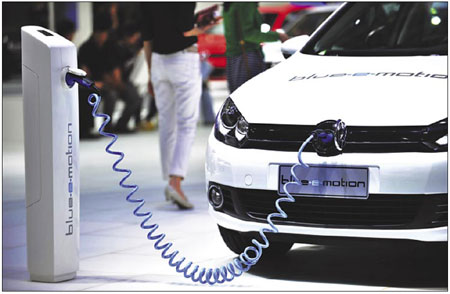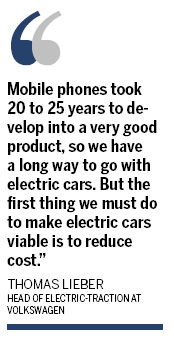Business
China wants to be global leader in electric vehicles
Updated: 2011-05-19 11:02
By Patrick Whiteley and Wang Chao (China Daily)
|
A Volkswagen Blue-E-Motion concept car with a charging station at April's Shanghai Auto Show. Ming Jianfei / for China Daily |
|
|
BEIJING - The electric car revolution is firing on all batteries with the first mass-market electric vehicles (EVs) going on sale in selected cities around the world. And China, desperate to clear increasing smog over its car-crazed cities, has vowed to become the world leader of the revolution - last month, the government made a commitment to spend 10.5 billion euros ($15 billion) over the next decade.
Considering the staggering predicted growth of China's car industry, it needs to take immediate action. By 2020, China's Ministry of Industry and Information Technology estimates, there will be more than 200 million registered vehicles on the roads, compared to the 70 million today.
But while zero-emission EVs are being hailed as C02 saviors, doubts still linger about whether China's aspiring new drivers will embrace these new and un-tested cars.
EVs lack power and driving range, require lengthy recharging times and are unable to hold a charge in cold climate - a big concern for Chinese drivers during the nation's long winters.
High sticker prices and a limited supply of charging facilities for new motorists without home garages - representing a majority of Chinese drivers - are other major hurdles facing the fledgling industry.
Electric cars are not new. In 1900, electric batteries powered almost 30 percent of the 4,192 cars produced in the United States that year. But as new motorists wanted more power and drive longer distances, electric cars were soon abandoned for the combustion engine. More than a century on, the same consumer concerns about battery limitations remain.
Governments and the motoring industry say they will address these problems as the EV rollout occurs over the next five to 10 years. But both groups are also banking on future EV products, with better battery technology, to help meet their very ambitious C02 reduction targets.
Two years ago the Chinese government announced a multi-billion euro plan which envisaged up to 20 million new energy vehicles in the nations road over the next 10 years.
Under the plan, new high-tech companies are being set up to significantly improve EV batteries, which make up half the cost of the vehicle and price the car out of reach from the average Chinese car buyer. For example, the battery in Nissan's new 24,000-euro Leaf model costs about 12,400 euros to produce.
China's National Development and Reform Commission said the State is also looking to subsidize the purchases of at least 4 million energy-efficient vehicles during the first rollout of EVs.
Since June last year, the Chinese government has been offering 60,000 yuan ($9,228) subsidies toward full electric cars in EV trial cities of Shanghai, Changchun, Shenzhen, Hangzhou, Hefei and Beijing.
In these test cities, local authorities are building infrastructure and trialing EV taxis and buses as they fine tune systems, which if successful, could be duplicated across the nation.
The eastern city of Hangzhou, for example, plans to have 23,000 EVs on its streets by the end of next year and the city government plans to have four charging stations, 38 express change stations and 3,500 charging poles.
Across the world, similar EV trial cities have become testing laboratories for motoring companies, which are closely monitoring their innovative, but relatively new battery technology.
Volkswagen, China's biggest selling foreign car brand, perhaps offers a realistic timetable of when electric cars will flow into the mainstream market.
Like many of the major automakers, VW is now trialing its EVs but does not plan to produce them on a wider scale until 2013-14. The first mass-produced electric VW sedan will not be ready until 2018.
Thomas Lieber, head of Electric-Traction at Volkswagen, compares the first breed of electric cars with the first range of mobile phones. "Mobile phones took 20 to 25 years to develop into a very good product, so we have a long way to go with electric cars," he told an EV conference in Beijing. "But the first thing we must do to make electric cars viable is to reduce cost."
The high cost of many EVs - BYD's e6 will be priced at 300,000 yuan (31,580 euros) when released this year - has been blamed for slowing down the momentum of the new-energy vehicle movement. BYD is perhaps China's most famous electric carmaker after US investor Warren Buffett bought a 10 percent stake in the company in 2008.
A JD Power study of new vehicle buyers in China - and in major markets around the world - reveals that while many consumers are intrigued by the idea of owning an electric vehicle, they balk when they learn about the price.
While EVs produced by the bigger auto companies are relatively more expensive, electric cars made by lesser-known Chinese companies are providing cheaper options for new car buyers.
In March, Kandi Technologies, a Hangzhou-based EV developer, released a new 89,800-yuan EV, which only costs 29,800 yuan (3,138 euros) after the 60,000-yuan subsidy.
With more budget models becoming available and as fuel prices continue to rise there is still keen public interest in EVs, which cost a quarter of the price to run compared to a regular car.
According to a new study by market research firm Ipsos, more than 85 percent of car owners and potential buyers surveyed in 119 Chinese cities said they would consider buying petrol-electric hybrid cars. Some 66 percent would purchase a purely electric car.
Those who said no to hybrid or pure electric cars cited concerns about technological maturity and electric recharging facilities.
Jacques de Selliers, managing director of Going-Electric, an association for EVs in Europe, said considering that more than 80 percent of cars in the world travel less than 60km a day, at slow speeds with just one occupant, EVs are a perfect clean transport solution for Chinese cities.
But de Selliers said there must be incentives for the Chinese public to buy EVs, and infrastructure must be in place.
"Eliminating the odd-even number plates restriction for EVs may be the most effective incentive in the Chinese plan," he said.
He said incentives used in Norway could also be used in China including offering EV owners priority lanes, free public parking and an abundant supply of cheap low-power charging poles in residential districts.
De Selliers said despite China's determination to become a world leader in EV vehicles it seems the current trials are not yet mature enough, and that charging infrastructure in China is insufficient.
"Europe, on the other hand, is launching Japanese, European and American EVs that are sufficiently mature to be accepted by consumers," he said.
But Chinese authorities say its nation has unique circumstances, which require a different solution.
Ouyang Ming Gao, director of the State Key Laboratory of Automotive Safety and Energy said the US and the EU have their own different standards and China cannot copy them when developing its own EV network.
"For example, the battery range in the US is required to be above 60 km a day, but in China, the range can be much lower, given the fact that China has a much dense population and they live relatively closer to working places," he said.
"In China, slow and small-power recharge should be suitable for the majority of drivers while on main roads, the fast and high-power recharge infrastructure should be adopted."
Stefano Nessi, manager of Electro-Mobility at Audi, said if electric cars are good enough and valued by customers, recharging will not become an issue.
"The iPhone needs to be charged every day, but the customer has no problem with that because the iPhone is such as interesting product," he said. "The challenge for car companies is to make EVs into the same interesting product that the customer is willing to sacrifice other features."
China plans to expand its EV infrastructure as sales of new energy vehicles grow and according to the government plan, up to 40 million new energy vehicles may be on the road by 2030. But this number has triggered concern about the stability of the Chinese power grid system.
Yang Junqian, chief expert of smart grid, EV and renewable energy department of Schneider Electric China, said the pressure on the grid system will be huge, when millions of EVs charge at the same time.
"Turning on the 2 kW air-conditioners at the same time can cause an instant power shortage on a summer night in major cities, not to mention charging millions of 20 kW EV batteries in a parking lot," Yang said.
However, Jiang Kejun, director of the energy research institute of National Development and Reform Commission, said the grid will be able to satisfy the charging needs by storing power during the off-peak hours.
"When people drive to their office, park their cars, and plug them into the recharging pillar, the pillar can transport power stored during the night to meet the demand," he said. "Besides, by 2030, the power generated should reach nine trillion kWh and the demand from charging electric cars will be just a small portion of the available power.
"And with better electric car battery technology in the future, power consumed by EVs will drop significantly. Now an EV needs 15 to 23 kWh a day, but in the near future it could drop to 8 kWh."
The source of additional electricity is another concern. EVs can help reduce C02 emissions, said Patrick Blain, president of International Organisation of Motor Vehicle Manufacturers, but only if the power source generating the electricity is clean.
"If we still get most of our electricity from the coal, we don't reduce a lot of CO2 emission in a real way, even if we drive EVs," he said.
"Nuclear energy is "clean", while it can also be "super dirty" when it is out of control. France already has 75 percent electricity coming from nuclear energy. We have no intention to increase this rate, but we have to consider how to manage the existing ones to serve EVs."
China has plans to reduce C02 emissions per unit of GDP by up to 45 percent by 2020 and over the next five years, authorities are aiming to use non-fossil fuels to supply more than 11 percent of the country's total energy consumption.
In 2009, the government invested 23 billion euros in wind, solar, biofuels, and other green energy products, and funding rises each year.
While environmental planners focus on the future, motoring companies are fixed on the now. At the Shanghai Auto show in April, 45 new EV models were wheeled out by the major global auto giants and also by Chinese companies including SAIC's Roewe 350 pure electric, Chang'an Motor's Benben, the Chery Rely M1-EV and Geely's Panda EK electric.
The FAW Group showcased nine new green vehicles and announced plans to spend 9.8 billion yuan (1 billion euros) on developing 16 environment-friendly passenger and business models by 2015. Dongfeng Motor Corp said it also planned to launch its first electric car next year and expected its electric car sales to reach 100,000 units by 2015.
BYD showed off its much-talked-about e6, which has distance of 320 km on a full charge, compared with the 225 km of the Nissan Leaf, which was released last year.
However BYD, which sold more than 500,000 regular cars in China last year, has continually delayed the release of its e6 in the US, prompting criticism from industry experts.
"The BYD electric car is a little big and clumsy," said Song Jian, executive vice-president of Tsinghua Automotive Engineering Institute. "I doubt the range claimed, because from the technical point of view, the quality of its battery is quite mediocre."
Till now, BYD e6 has just completed its one-year on-road testing, while the many other EV products have yet to prove themselves. But BYD, which means Build Your Dreams, may accelerate its electric dreams further after it last year teamed up with Daimler, the maker of Mercedes Benz and the two have formed a joint venture to develop a new EV brand.
Other global auto giants have already released their new energy vehicles to the public. Mitsubishi's four-seater, bubble-shaped i-MiEV was the first mass-market electric vehicle to go on sale in Japan.
General Motors's plug-in hybrid, the Chevy Volt, was launched in the US last year and the US Environmental Protection Agency rates it as the most fuel-efficient car with a combustion engine sold in the US.
Based on a sample of the 1,210 Volts sold in the US in the first quarter of 2011, GM reported that Volt customers drive on average 1,600 km before they needed to fill the gasoline tank. GM plans to release the Volt in China after October this year as well its other new models to satisfy the high demand for new cars.
The consequence of the rapid growth of new car owners is not lost on the government, which needs its EV plan to be successful, despite the wildly fluctuating projections by industry experts.
Chen Qingquan, chairman of the World Electric Vehicle Association, expects China will lead the electric-vehicle sector with an estimated 15 percent market share for hybrid and pure-electric vehicle sales by 2020.
That compares with JP Morgan Chase & Co's estimate that electric vehicles will only account for 1 or 2 percent of global vehicle sales by then.
In the end, the market will decide the fate of EVs, said Lin Yi, vice-chief engineer of Beijing Auto Industry Holdings Co (BAIC).
"We cannot assume the electric car is the future of auto industry, so we are developing hybrid, electric and fuel cell cars at the same time," he said. "When the market is clear enough, we will then switch the direction.
"The principle also applies to the commercialization of EVs. Some experts suggest battery lease, and others insist on selling complete EVs.
"There is not much point in discussing it because the right business model will be decided by the market."
China Daily
Specials

The song dynasty
There are MORE THAN 300 types of Chinese operas but two POPULAR varieties are major standouts

Sino-US Dialogue
China and the US hold the third round of the Strategic and Economic Dialogue from May 9-10 in Washington.

Building communities
American architect John Portman and his company have developed more than 30 projects across China.

